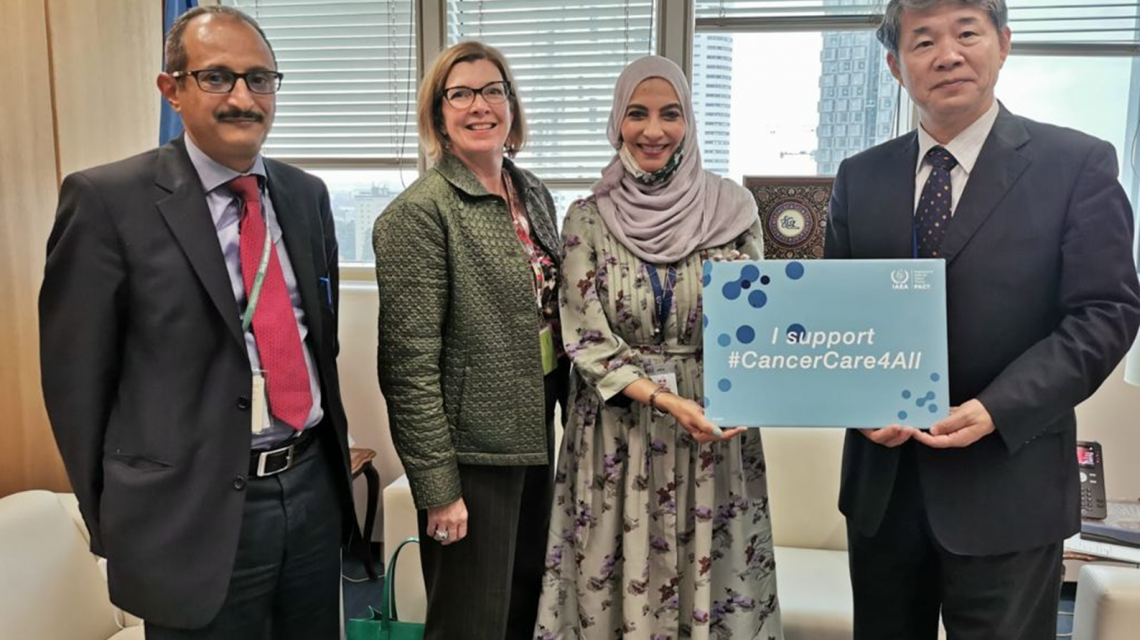Building on their successful collaboration to improve cancer control and expand women's access to effective, safe and sustainable cancer prevention, diagnostics and treatment services, the Islamic Development Bank (IsDB) and the IAEA are exploring ways to grow their partnership. At a meeting on the margins of the 65th IAEA General Conference last month, Hayat Sindi, Senior Advisor in Science, Technology and Innovation for the President of the IsDB and Director General Rafael Mariano Grossi assessed the status of projects carried out together, and discussed steps to enhance the partnership and identify new areas of collaboration.
Collaboration between the IAEA and the IsDB received a major boost in September 2019 when the two organizations signed the Women's Cancers Partnership Initiative for Breast and Cervical Cancer Control in Low and Middle Income Countries to improve the quality of life of women with cancer by providing high-quality healthcare. Under this agreement, the IAEA, IsDB and other partners are working to increase access to cancer services for women in low and middle income countries, by expanding programmes to address breast and cervical cancer. This includes upgrading cancer facilities with equipment, providing training and education, and integrating the use of nuclear and radiation medicine into national cancer control programmes.
The Partnership Initiative has led to joint outreach efforts to engage current and potential partners, to raise awareness of the benefits of joining the partnership, and to sensitize decision makers on the need to tackle women's cancers in low and middle income countries. The IAEA and IsBD are exploring other potential avenues of cooperation, such as the IAEA Zoonotic Disease Integrated Action (ZODIAC), an initiative that aims to build capacity in Member States in the use of nuclear and related techniques for detection of zoonotic diseases; and NUclear TEChnology for Controlling Plastic Pollution (NUTEC Plastics), an initiative to address plastic pollution that leverages the IAEA's experience in marine monitoring using isotopic tracing techniques and potential applications of nuclear technology in plastic recycling.

Dr Hayat Sindi of the Islamic Development Bank meets with Hua Liu, IAEA Deputy Director General and Head of the Department of Technical Cooperation, Lisa Stevens, Director of the IAEA Programme of Action for Cancer Therapy and Mahfoudh Abdullah, Programme Coordinator for IAEA Technical Cooperation. (Photo: J. Otárola-Silesky/IAEA)
Hua Liu, IAEA Deputy Director General and Head of the Department of Technical Cooperation, and Najat Mokhtar, IAEA Deputy Director General and Head of the Department of Nuclear Sciences and Applications, as well as directors of the regional technical cooperation and human health divisions, also met with Sindi to discuss programmatic opportunities for collaboration.
"The IAEA is committed to strengthening its support to Members States by enhancing our relationships with key partners such as the IsDB" said Liu. "The Women's Cancers Partnership Initiative is a clear example of what we can do together. It offers a pattern for how we can move forward to other strategic areas of Agency work, such as addressing zoonotic diseases and controlling plastic pollution, with the support of the IsDB".
"Having these years of experience as successful partners puts us in a good position to explore other areas of common interest based on country needs," said Sindi. "Both the IsDB and the IAEA possess valuable knowledge in boosting development, and when these skills are combined with the support of other international organizations, financial institutions, the private sector, NGOs and civil society, we can really expand our impact and improve people's lives in very concrete ways".
Since its launch, the Women's Cancers Partnership Initiative has inspired donors to provide financial support for IAEA technical cooperation projects on women's cancers. For example, a project with Uzbekistan will start in coming months in which the IAEA will provide technical advice to the Government of Uzbekistan in the implementation of the initiative to increase access among women to cancer care.






